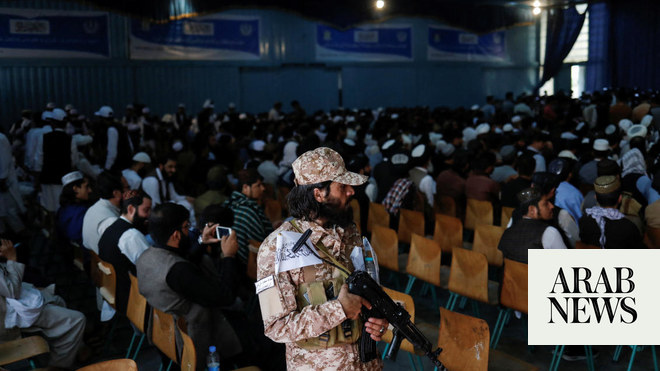
As Daesh fighters try to defend Baghouz, their last enclave in eastern Syria, it is important to heed the warnings of top military commanders that the fight against the terror group is not going to be over any time soon. Most likely, Daesh will lose Baghouz, ending its control over the large parts of Syrian territory it seized in 2014, when it declared Raqqa as the capital of its “caliphate.” However, although Daesh will soon be without any significant territorial hold, most likely this is not going to be the end of the terror group or its hateful ideology.
Daesh remains a threat. In other parts of Syria where it was routed, its fighters continue to launch attacks from their remote desert hideouts. Similarly, in Iraq, Daesh has gone underground but has continued to stage attacks.
Last Thursday, the top commander in charge of the US military in the Middle East warned that Daesh in Iraq and Syria was going underground not to disappear into oblivion, but to regroup. Gen. Joseph Votel, head of US Central Command, said in his testimony before the US House of Representatives Armed Services Committee that the fight against Daesh was “far from over.”
Votel lauded the territorial defeat of Daesh as a “monumental military accomplishment,” whereby its territorial control was reduced from 34,000 square miles at its height down to “less than a single square mile.” But he warned that “the fight against (Daesh) and violent extremism is far from over,” and that the Daesh “population being evacuated from the remaining vestiges of the caliphate largely remains unrepentant, unbroken and radicalized.” He also noted: “What we are seeing now is not the surrender of (Daesh) as an organization but a calculated decision to preserve the safety of their families and the preservation of their capabilities… and going to… remote areas and waiting for the right time to resurge.”
Votel called for a “vigilant offensive” against Daesh to continue, targeting its “leaders, fighters, facilitators, resources and of course their toxic ideology.”
“What our focus has to be is working with our partners on the ground, as we are doing fairly effectively in Iraq now,” he added, saying that US intelligence, training and advice would be key to helping America’s local allies combat the remnants of Daesh.
What accounts for the resilience of Daesh and its core ideology?
The lack of a political solution in Syria has helped Daesh capitalize on people losing hope.
Abdel Aziz Aluwaisheg
First, its ideology still attracts enough misguided young people in Syria and Iraq who are frustrated, humiliated and marginalized without hope and without other alternatives. The Global Coalition Against Daesh has tried to challenge that corrupt ideology, but has not been able to defeat it. More promising are local counter-radicalization centers. The Gulf Cooperation Council (GCC) countries alone boast about a dozen specialized entities for tackling Daesh ideology on all media platforms. They have made a dent, at least, judging by the dwindling numbers of GCC youths joining Daesh and the increasing numbers of returnees.
Second, the promised recovery and reconstruction — and with it the creation of jobs and resumption of basic governmental services — are so far non-existent in Syria and just barely starting in Iraq. Delays in the stabilization efforts in areas liberated from Daesh play into the hands of the organization and help it maintain its pull for disenfranchised youth.
Third, the lack of a political solution in Syria has helped Daesh capitalize on people losing hope. The triumphalist approach of the Syrian regime and its allies, as well as that of the returning sectarian militias in Iraq, further fuel young people’s discontent.
Fourth, President Donald Trump’s statements about US troop withdrawals may also have figured in Daesh’s calculations. They may have decided to wait out the Americans and come back when they are completely departed. While Trump initially announced his intention to fully withdraw the final 2,000 US troops from Syria, the US has since decided to maintain about 400 troops there. About half of them will be stationed in northeast Syria to help prevent a Daesh resurgence, while the other half will be at Al-Tanf military base. But, even with this US clarification about the troop reduction, Daesh may think that it is only a matter of time before they all leave.
Fifth, Iraq has taken major steps toward normalizing its political landscape in terms of successful parliamentary elections and the formation of a stable coalition government, but genuine reconciliation between the different political groups has not taken place; not between Sunni and Shiite political blocs and not within each sect.
Sixth, abusive practices by sectarian militias may be the most effective recruitment tool utilized by Daesh. In Iraq in particular, international donors must prioritize aid and training to local police units, together with the placement of international observers to build trust and support among the population recently freed from Daesh. Those local police units should completely replace army, counter-terrorism (CT) units, and sectarian militias from urban areas. The army and CT units can then focus on challenging Daesh’s influence in ungoverned spaces outside the cities.
For these reasons, it is unlikely that Daesh’s territorial loss will result in its demise. The global coalition, and its individual members, should now switch gears and work harder on ensuring peace in the lands freed from its control.
Abdel Aziz Aluwaisheg is the Gulf Cooperation Council (GCC) assistant secretary-general for political affairs and negotiation, and a columnist for Arab News. The views expressed in this piece are personal, and do not necessarily represent those of the GCC. Twitter: @abuhamad1
Disclaimer: Views expressed by writers in this section are their own and do not necessarily reflect Arab News" point-of-view












